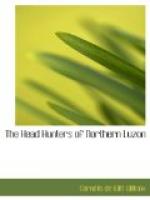“This calling on Aliguyen’s soul never ceased. When an old woman got hoarse, another took her place. As the procession came to the house it filed past Aliguyen and its leaders stopped and shouted words to the same effect. The key-note of the whole ceremony was vengeance. It is true that both persons who were involved in killing Aliguyen were themselves killed, but the people of a rancheria regard themselves as being about the only real people in the world and hold that three, four, or five men of another rancheria are not equal to one of theirs.
“Nagukaran being the rancheria that speared and nearly killed my predecessor, Mr.——, I explained my presence to the people there by saying that the soldier, being an agent of our Government, was in a way a relative of mine. The explanation was a perfectly natural one to the people, and they treated me with the greatest courtesy and helped me to see whatever was to be seen.
“Toward noon they told me that they were going to perform the feast which looked towards securing vengeance for Aliguyen’s death. They went to where the people had built a shed to protect them from the sun’s fierce rays on a little hillock some distance from any house. Two pigs were provided there, one being very small. Only the old men were permitted to gather around the pigs and the rice-wine and the other appurtenances of the feast. The feast began by a prayer to the ancestors, followed by an invocation to the various deities. The most interesting and the principal part of the feast was the invocation to the celestial bodies, who are believed to be the deities of War and Justice, Manahaut (The Deceiver), a companion of the Sun God, was first invoked. The people cried: Who-oo-oo! Manahaut, look down! Come down and drink the rice-wine and take the pig! Don’t deceive us! Deceive our enemies! Take them into the remotest quarters of the sky-world; lock them up there forever so that they may not return! Vengeance for him who has gone before!’ Then an old man put his hands over his forehead and called: ‘Come down, Manahaut.’ Manahaut came and possessed him, causing him to call out: ’Sa-ay! sa-ay! I come down Manahaut; I drink the rice-wine; I will deceive your enemies, but I will not deceive you,’ The old man, possessed, jumps up and, with characteristic Ifugao dance step, dances about the rice-wine jar and about the pig. Quickly follows him a feaster who has called Umalgo, the Spirit of the Sun, and was possessed by him. Manahaut dances ahead of Umalgo to show him the pig. Umalgo seizes a spear, dances about the pig two or three times, when he steps over to it and with a thrust, seemingly without effort, pierces its heart. The blood spurts out of the pig’s side and there quickly follows a feaster who has been possessed by Umbulan, who throws himself on the pig and drinks its blood. He would remain there forever, say the people, drinking the pig’s blood, were it not




